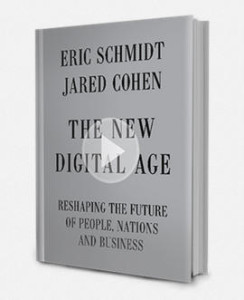A little over a year ago, someone recommended a book to me…The New Digital Age by Eric Schmidt and Jared Cohen. It was recommended by some friends in education. I will quickly agree that there are a lot of ramifications for education out of this book, but it wasn’t really geared towards education. I picked it up a few times and really had a hard time getting in to it. Honestly, there is some super valuable information in here related to the pervasiveness of technology in our culture. As a Christian…and this is not a Christian book…I am constantly having to make choices about where I am going to spend my time…spiritually, emotionally, physically, and socially. Technology is a part of every area of our lives and we must make wise decisions about stewardship in this area. Much like we budget our money and our other resources, we need to make a plan for how much technology we are going to “let in”. Schmidt and Cohen did a great job of giving a global picture of how technology it’s related connectivity have changed everything about the way we approach business and other interactions.
I highlighted several things while reading and have posted them below…
- The Internet is among the few things humans have built that they don’t truly understand.
- What began as a means of electronic information transmission—room-sized computer to room-sized computer—has transformed into an omnipresent and endlessly multifaceted outlet for human energy and expression.
- By 2025, the majority of the world’s population will, in one generation, have gone from having virtually no access to unfiltered information to accessing all of the world’s information through a device that fits in the palm of the hand.
- Communication technologies represent opportunities for cultural breakthroughs as well as technical ones.
- On the world stage, the most significant impact of the spread of communication technologies will be the way they help reallocate the concentration of power away from states and institutions and transfer it to individuals.
- In the months following our trip, it became clear to us that there is a canyon dividing people who understand technology and people charged with addressing the world’s toughest geopolitical issues, and no one has built a bridge.
- This is not a book about gadgets, smart-phone apps or artificial intelligence, though each of these subjects will be discussed. This is a book about technology, but even more, it’s a book about humans, and how humans interact with, implement, adapt to and exploit technologies in their environment, now and in the future, throughout the world. Most of all, this is a book about the importance of a guiding human hand in the new digital age. For all the possibilities that communication technologies represent, their use for good or ill depends solely on people. Forget all the talk about machines taking over. What happens in the future is up to us.
- The introduction of mobile phones is far more transformative than most people in modern countries realize.
- More effective communication across borders and languages will build trust and create opportunities for hardworking and talented individuals around the world. It will not be unusual for a French technology company to operate its sales team from Southeast Asia, while locating its human-resources people in Canada and its engineers in Israel. Bureaucratic obstacles that prevent this level of decentralized operation today, like visa restrictions and regulations around money transfers, will become either irrelevant or be circumvented as digital solutions are discovered.
- New levels of collaboration and cross-pollination across different sectors internationally will ensure that many of the best ideas and solutions will have a chance to rise to the top and be seen, considered, explored, funded, adopted and celebrated.
- The key advance ahead is personalization. You’ll be able to customize your devices—indeed, much of the technology around you—to fit your needs, so that your environment reflects your preferences.
- Connectivity benefits everyone.
- The impact of this data revolution will be to strip citizens of much of their control over their personal information in virtual space, and that will have significant consequences in the physical world.
- Identity will be the most valuable commodity for citizens in the future, and it will exist primarily online.
- Since information wants to be free, don’t write anything down you don’t want read back to you in court or printed on the front page of a newspaper, as the saying goes. In the future this adage will broaden to include not just what you say and write, but the websites you visit, who you include in your online network, what you “like,” and what others who are connected to you do, say and share.
- Technology companies will need to exceed the expectations of their customers in both privacy and security protections.
- Connectivity will change how we view opposition groups in the future.
- As we look into the future—its promises and its challenges—we are facing a brave new world, the most fast-paced and exciting period in human history. We’ll experience more change at a quicker rate than any previous generation, and this change, driven in part by the devices in our own hands, will be more personal and participatory than we can even imagine.
